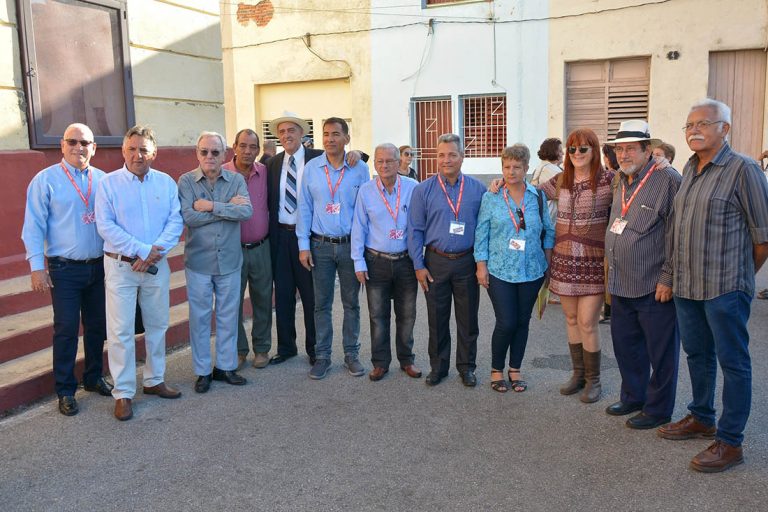It was in the decade of anti-Machado struggles, of the 1930’s, when Dr. Emilio Roig de Leuchsenring was honored with the title of Historian of the city of Havana.
He deserved it, for having been a fervent defender of our Homeland History, and he demonstrated it not only with cultivated knowledge, but also by designing the roots, the truths and the contents from the Museum, the Archive and the Library that it gestated of that history within the reach of the Cuban people.
Roig de Leuchsenring was a revolutionary intellectual who professed with his word, deeds and helps to interpret in many the virtue of our long and heroic historical process; he was a creator of patriotic and humanistic values, defender of our independence and sovereignty.
He taught us that it was not enough to admire and know about facts and their protagonists, because it was necessary to reflect and know how to love history as it is the foundation and culture of the nation.
About its origins
Born in the midst of a unique social situation, on August 23rd, 1889, he grew up in another, precisely in the midst of the evacuation of Spanish troops at the time of the fatal arrival of the first battleships from the North bringing the first Yankee intervention troops. Those were experiences that would not escape his historian’s orbit.
The historian’s commitment to Cuba
That Republic, which would be undermined by the Yankees, would make the dedicated intellectual commit himself with unshakeable faith to defend the corpus of libertarian ideas that would have driven thousands of patriots to the emancipatory struggles in 1868 and 1895. Roig de Leuchsenring proved that from the empty historical speech it was necessary to change to the concrete denouncement of the evils of the Plattist Republic. Because of everything, “lucid and enthusiastic” – as Dr. Eusebio Leal Spengler would point out from his mentor – the historian went out to save the National Heritage, to preserve historical sites and places, to disseminate the true history of the Cuban nation, to wave the tricolor flag of freedom …
In that incessant struggle he would share science, conscience and culture with several of the enlightened avant-garde thinkers such as, one of the first Cuban Marxists José Antonio Portuondo, Alejo Carpentier, Jorge Mañach, Manuel Márques Sterling, Nicolás Guillén, José Manuel Poveda, Mariano Brull, Ramiro Guerra Sánchez, Marcelo Pogolotti, José María Chacón y Calvo, Regino Boti, Alfonso Hernández Catá, Cosme de la Torriente, the guys from the Retail Group…
The list is longer … And his epochal narrowing and true revolutionary commitment to Commander-in-Chief Fidel, Che Guevara and Antonio Núñez Jiménez What a privilege of the historian, to hang out with those intellectuals, directly or indirectly responsible for the youth insurgency of the 30s and 50s of the 20th century!
The historian in defense of just causes
The historian lovingly embraced the homeland of Puerto Rican leader Pedro Albizu Campos, and shared friendship with those from the homeland of Martí who admired Sandino’s struggles in long-suffering Nicaragua; he also knew of the splendor of the Mexican Revolution of 1910; and admired the spark of the Russian Revolution of 1917; By the way, like other revolutionary intellectuals of his time, he would repudiate the fascist aggression against the Spanish Republic, which would count on the solidarity of the Greater Antilles.
In that struggle, Roig de Leuchsenring, with a broad knowledge of history and Cubanness; assuming that the right time had come to revolutionize insular thought. He would approach the dawn of the Moncada to publicize his capital work Cuba does not owe its independence to the United States, a text whose first edition would see the light thanks to the efforts of the Cuban Society for Historical and International Studies, in Havana, in 1950.
From now on, after its reading by the hurting people, another would begin to be the National History. The historian would still have life to see the changes that would ensue with the victory of January 1st, the Agrarian Reform, the victory of the Literacy Campaign and the first defeat of Yankee Imperialism in America on the sands of Playa Girón.
Roig de Leuchsenring died on August 8th, 1964, at that time in his days, surely, satisfied to corroborate his thesis:
“(…) Cuba does not owe its independence to the United States of North America, but to the efforts of its people (…)”
Such an example of a revolutionary deserves to be evoked and imitated by those of the Cuban historians union in the midst of the current national situation characterized by the exacerbation of the unjust and criminal Yankee economic, commercial and financial sanctions against Cuba, a massive, flagrant and systematic violation of Human Rights that intends to break the resistance and dignity of the people of Céspedes, Martí and Fidel.
Translated by: Aileen Álvarez García






